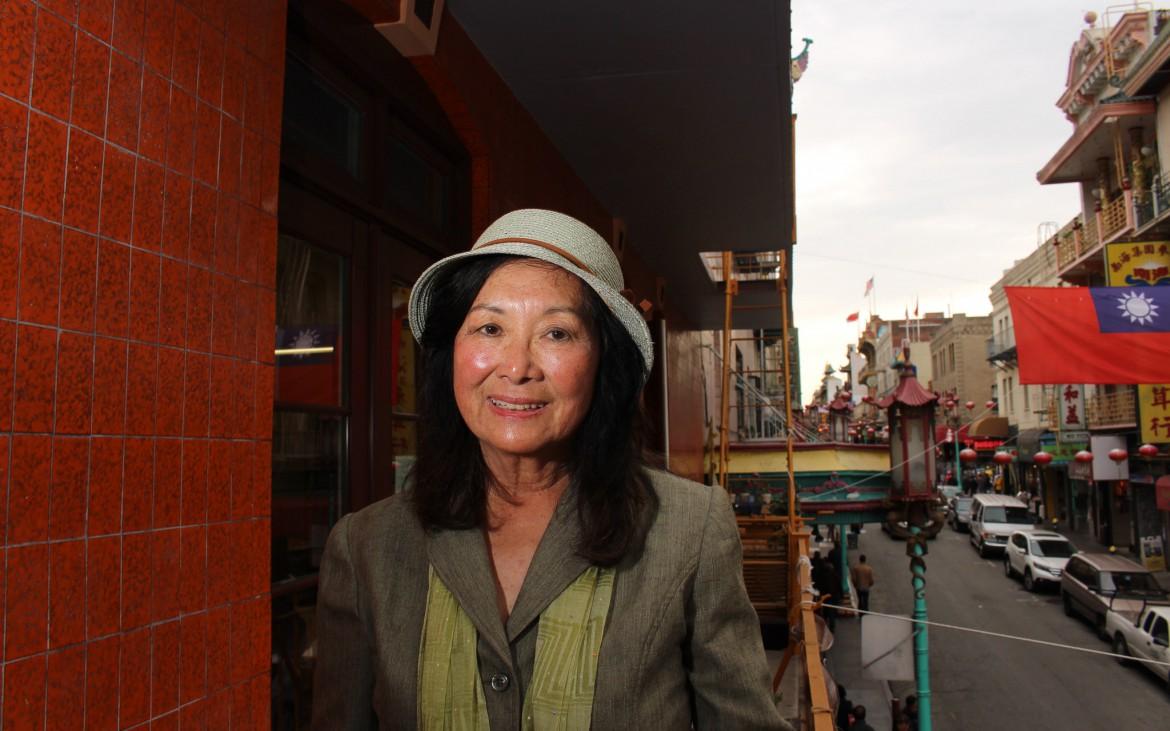Wilma Peng, candidate for District 3 Supervisor, encompassing San Francisco’s Chinatown and North Beach neighborhoods, poses for a portrait in Chinatown. Photo by James Chan
By Sean McGrier
The race for the District Three seat on the San Francisco Board of Supervisors pits a familiar political face against a fresh mayoral appointee, while an educator and longtime community activist is content to sit in a distant third place.
Aaron Peskin represented the district, which encompasses the iconic North Beach and Chinatown neighborhoods, from 2001 to 2009. Peskin served as the board’s president for the last four years of his tenure.
Peskin is trying to win his old post back from Julie Christensen, who was appointed by Mayor Ed Lee in January. Lee is a longtime Peskin foe.
The tech-friendly, moderate mayor has a favorable majority currently sitting on the board. Moderate board members hold a six to five vote stranglehold over the progressive caucus on many civic issues. If Peskin takes the seat from Christensen, that balance of power could shift to the progressives.
“(Peskin) would certainly be progressive,” said District 11 Supervisor John Avalos. “Whether we would have enough to get to six votes and be a majority? On some issues, yes. On other issues, no.”
Peskin has, as predicted, relied on his record to help him regain the seat he vacated six years ago. While speaking to SFGov.TV, the Telegraph Hill resident championed his successful opposition to the 8 Washington luxury condominium development project. Had the 8 Washington project been allowed, it would have given developers the green light to build high-rise condos along the district’s eastern waterfront.
Peskin also pointed to a dysfunctional City Hall and a Lee-controlled District Three incumbent as reasons to reinstall Peskin on the board.
“We need an independent voice at City Hall,” Peskin told SFGov.TV. “(Someone) not basing decisions on who’s for it or who’s against it, or what special interest has donated or what the mayor thinks.”
Rebecca Sarinelli, a North Beach resident and owner of North Beach Copy Center, said she’s voting for Peskin because she believes he’ll help redirect a city she claims has gone wayward. She said Peskin’s independence from special interest parties, like Silicon Valley investor Ron Conway, gives her some hope for San Francisco’s future.
“This is bigger than just San Francisco,” Sarinelli said. “(This election) is gonna set the tone and the footprint for what’s gonna happen in the next decade.”
Lee appointed Julie Christensen to the District Three seat on Jan. 8, 2015 to replace David Chiu, after Chiu was elected to the California State Assembly.
Christensen, a North Beach small business owner before her appointment, gained popularity in her neighborhood after she helped push through major renovations to the North Beach Library. That project came coupled with an overhaul of the then run-down Joe DiMaggio North Beach Playground, which sits adjacent to the new library. She helped the Friends of Joe DiMaggio Playground, a non-profit organization comprised of North Beach residents, secure city funding for the park’s facelift.
Christensen could celebrate her first public office victory shortly before the park’s makeover is completed. The playground is scheduled to reopen 10 days after the Nov. 3 election.
Wilma Pang, 75, is District Three’s familiar long-shot candidate. The City College of San Francisco music teacher has run for the board of supervisors seat twice before. She has also run for mayor twice, and for the board education once. Despite running for office on five separate occasions, Pang is the only District Three candidate who has never held public office. The Chinatown resident said she doesn’t expect to win this time either.
“I am not trying to win the district because in reality, these two people spent millions in campaign money,” Pang said. “I really did not intend to run, but the community said, ‘You have to speak up for us.’“
Pang said Peskin and Christensen “bombard” Chinatown with signs and flyers because, according to the media, it’s the district’s swing neighborhood. If Pang carries a large enough number of votes, her involvement could determine the victor.
In 2008, Pang grabbed 3.5 percent of the District Three electorate, finishing fourth with 939 votes, according to the San Francisco Department of Elections.
Pang fared better in 2012,when she garnered 1,033 votes for 4.4 percent of voters.












